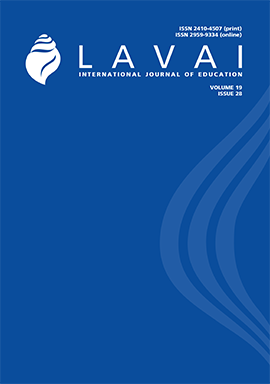Exploring the Relationship Between Personal Values and Professional Attitude of Journalism Students
DOI:
https://doi.org/10.5564/lavai.v19i28.2799Keywords:
Personal values, professional characteristics, basic principles of journalism, professional attitudeAbstract
Numerous studies have investigated the correlation between personal values and the quality of education among journalism students. However, limited research has been conducted on the connection between personal values and the professional attitudes of journalists. To address this research gap, we conducted a survey among 45 students (representing 53.09% of all students) enrolled in the Journalism Program at MNUE (Mongolian National University of Education). The objective was to identify their unique values and define shared principles. The survey employed questionnaires that required participants to select three values from each of the following categories: livelihood, health, and intellect. These questionnaires were then processed using the SPSS-26 program, following the "Triads of Values of a Person" model established by previous researchers. The novelty and focus of this article are emphasized by the examination of the collected data in relation to professional education and students' attitudes towards training. The results revealed significant diversity in the selection of values within the Livelihood category, while values associated with health exhibited the highest frequency (n = 44 for "Health," n = 27 for "Freedom," and n = 25 for "Intellect and knowledge"), indicating a consistent system of values. The Intellect category demonstrated relatively common value selection. Considering the potential connection between these outcomes and the "attitude of a specialist journalist" within the journalism curriculum, an analysis was conducted. Based on the analysis, this article advances the notion that assisting students in establishing a professional attitude based on their personal values is more crucial than solely focusing on knowledge acquisition and skill development during their professional training.
Суралцагчдын “бие хүний үнэт зүйл” ба мэргэжилтний хандлагын уялдаа холбоо
Сэтгүүлч мэргэжлээр суралцагчдын бие хүний үнэт зүйлсийг сургалтын чанартай холбож судалсан судалгаа цөөнгүй байдаг. Харин “бие хүний үнэт зүйлс” нь тэдэнд сургалтаар төлөвшүүлж буй сэтгүүлч мэргэжлийн хандлагатай хэрхэн холбогдох талд анхаарал хандуулсан судалгаа хомс байна. Иймээс бид бие хүний үнэт зүйлс болон мэргэжлийн хандлагын хоорондох уялдаа холбоог Монгол Улсын Боловсролын Их Сургуулийн сэтгүүлчийн ангийн нийт оюутны 45 оюутнаас (нийт оюутны 53.09%) хувь хүний үнэт зүйлийг нь тодорхойлох асуулга судалгаа авч хийлээ. Өмнөх судлаачдын боловсруулсан “Нэгэн хүний амин хүрээний үнэт зүйлийн гурвалууд” загвараар оюутнуудаас ахуйн, амины, ухамсрын түвшний тус бүр гурван үнэт зүйл сонгох нөхцөлөөр асуулга авч, SPSS - 26 программд боловсруулалт хийв. Гарсан үр дүнг мэргэжлийн сургалтын агуулга, суралцагчдад төлөвшүүлэх хандлагатай холбон шинжилсэн нь энэхүү өгүүллийн шинэлэг болон хязгаарлагдмал талыг илтгэнэ. Гурвалуудаас ахуйн түвшний үнэт зүйлийн сонголт ихээхэн тархмал шинжтэй, харин амины түвшний үнэт зүйлийн хувьд “Эрүүл мэнд” сонголт илүү давтамжтай (n = 44) илэрсэн бол үүний дараагаар “Эрх чөлөө” (n = 27) болон “Оюун ухаан, мэдлэг боловсрол” (n = 25) гэсэн сонголтууд гарсан байна. Ухамсрын түвшний үнэт зүйлийн сонголт нь харьцангуй тархмал шинжтэй үр дүн гарлаа. Энэхүү үр дүнг сэтгүүл зүйн сургалтын хөтөлбөр дэх “Сэтгүүлч мэргэжилтний хандлага”-тай тодорхой байдлаар холбогдоно гэх таамаглал дэвшүүлэн, зарим шинжилгээг хийсэн болно. Үүнд үндэслэн энэхүү өгүүллээрээ мэргэжлийн сургалтад мэдлэг, ур чадвар эзэмшүүлэхээс бие хүний үнэт зүйлд суурилж суралцагчдад мэргэжлийн хандлагыг төлөвшүүлэх нь илүү чухал гэсэн үзэл санааг дэвшүүллээ.
Түлхүүр үг: Yнэт зүйл, мэргэжлийн онцлог, сэтгүүл зүйн үндсэн зарчим, мэргэжилтний хандлага
Downloads
747
References
Committee, D. (1948). General Assembly resolution 217 A. Universal Declaration of Human Rights, Article 19. Palais de Chaillot, Paris. https://documents-dds-ny.un.org/doc/RESOLUTION/GEN/NR0/043/88/PDF/NR004388.pdf?OpenElement
Drok, N. (2019). Journalistic Roles, Values and Qualifications in the 21st century : how European journalism educators view the future of a profession in transition. Netherlands: Hogeschool Windesheim
Fischer, C. A. (2019). Werte als Kerne von Kompetenzen. Eine theoretische Studie mit einer empirischen Analyse in Montessori-Schulen. Münster: Waxmann. Ludwig-Maximilians-Universität München.
John Erpenbeck, W.S. (2018). Wertungen, Werte-Das Fieldbook fuer ein erfolgreiches Wertemanagement. Berlin, Heidelberg: Springer. doi: https://doi.org/10.1007/978-3-662-54779-3
Paul H. P. Hanel, Colin Foad and Gregory R. Maio. (2021). Attitudes and Values. Psychology. United Kingdom: Oxford University Press. doi: https://doi.org/10.1093/acrefore/9780190236557.013.248
Schwartz, S. (2010). Are there Universal Aspects in the Structure and not Content of Human Values? In M. Ros, & V. Gouveia (Eds.). Journal of Social Issues, pp. 19-45. doi: https://doi.org/10.1111/j.1540-4560.1994.tb01196.x
Ureneck, L., (Ludtke, M, Хян). (2007). Values Reside at the Core of Journalism. Nieman reports, 61 (3), 82.
Батбаатар, Ж. (2023). Суурь сэтгүүл зүй. Улаанбаатар: Мөнхийн үсэг.
Батзориг, Т. (2019). Монголын хэвлэл мэдээллийн хараат бус байдлын судалгаа. Улаанбаатар: Соёмбо принтинг.
Зулькафиль, М. (2004). Сэтгүүл зүйн онолын үндэс. Улаанбаатар: Китаб.
Болд-Эрдэнэ, Б., Зулькафиль, М нар. (2021). Сэтгүүл зүйн үндэс. Улаанбаатар: МУИС хэвлэлийн газар.
Наранжаргал, Х. (2021). Чөлөөт илэрхийлэл ба чөлөөт сэтгүүл зүй. Улаанбаатар: Чөлөөт хэвлэл сан.
Санчес, А. К. (2000). Үнэт зүйлсийн төлөвшил: онол, эргэцүүлэл ба хариулт. Мексик: Григалбогийн редакц.
Сүхболд, Б. (2021). Үнэт зүйлийг нэг ертөнцийн хандлагын үүднээс шинжихүй. Улаанбаатар: МУБИС хэвлэх цех.
Downloads
Published
How to Cite
Issue
Section
License
Copyright (c) 2023 Amartuvshin Sukhee

This work is licensed under a Creative Commons Attribution 4.0 International License.
Copyright on any research article in the Lavai - International Journal of Educatioin is retained by the author(s).
The authors grant the Lavai - International Journal of Educatioin a license to publish the article and identify itself as the original publisher.

Articles in the Lavai - International Journal of Educatioin are Open Access articles published under a Creative Commons Attribution 4.0 International License CC BY.
This license permits use, distribution and reproduction in any medium, provided the original work is properly cited.




